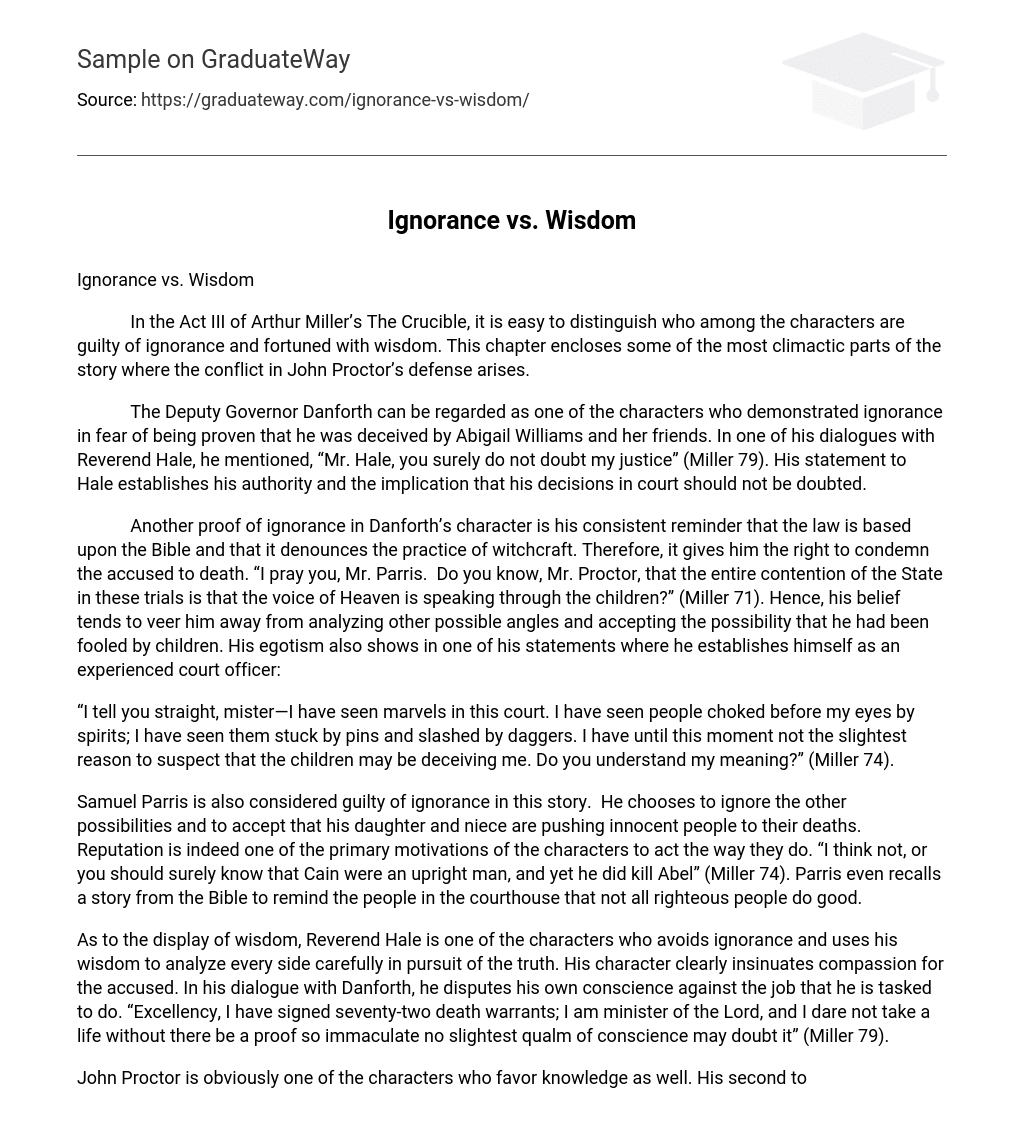In the Act III of Arthur Miller’s The Crucible, it is easy to distinguish who among the characters are guilty of ignorance and fortuned with wisdom. This chapter encloses some of the most climactic parts of the story where the conflict in John Proctor’s defense arises.
The Deputy Governor Danforth can be regarded as one of the characters who demonstrated ignorance in fear of being proven that he was deceived by Abigail Williams and her friends. In one of his dialogues with Reverend Hale, he mentioned, “Mr. Hale, you surely do not doubt my justice” (Miller 79). His statement to Hale establishes his authority and the implication that his decisions in court should not be doubted.
Another proof of ignorance in Danforth’s character is his consistent reminder that the law is based upon the Bible and that it denounces the practice of witchcraft. Therefore, it gives him the right to condemn the accused to death. “I pray you, Mr. Parris. Do you know, Mr. Proctor, that the entire contention of the State in these trials is that the voice of Heaven is speaking through the children?” (Miller 71). Hence, his belief tends to veer him away from analyzing other possible angles and accepting the possibility that he had been fooled by children. His egotism also shows in one of his statements where he establishes himself as an experienced court officer:
“I tell you straight, mister—I have seen marvels in this court. I have seen people choked before my eyes by spirits; I have seen them stuck by pins and slashed by daggers. I have until this moment not the slightest reason to suspect that the children may be deceiving me. Do you understand my meaning?” (Miller 74).
Samuel Parris is also considered guilty of ignorance in this story. He chooses to ignore the other possibilities and to accept that his daughter and niece are pushing innocent people to their deaths. Reputation is indeed one of the primary motivations of the characters to act the way they do. “I think not, or you should surely know that Cain were an upright man, and yet he did kill Abel” (Miller 74). Parris even recalls a story from the Bible to remind the people in the courthouse that not all righteous people do good.
As to the display of wisdom, Reverend Hale is one of the characters who avoids ignorance and uses his wisdom to analyze every side carefully in pursuit of the truth. His character clearly insinuates compassion for the accused. In his dialogue with Danforth, he disputes his own conscience against the job that he is tasked to do. “Excellency, I have signed seventy-two death warrants; I am minister of the Lord, and I dare not take a life without there be a proof so immaculate no slightest qualm of conscience may doubt it” (Miller 79).
John Proctor is obviously one of the characters who favor knowledge as well. His second to the last statement in Act III indicates his confession as a sinner and his humility to accept the fate that may be waiting for him in the after life.
“A fire, a fire is burning! I hear the boot of Lucifer, I see his filthy face! And it is my face, and yours, Danforth! For them that quail to bring men out of ignorance, as I have quailed, and as you quail now when you know in all your black hearts that this be fraud – God damns our kind especially, and we will burn, we will burn together!” (Miller 96).
In conclusion, Act III of The Crucible can be considered one of the most intricate parts of the story. Hale, Proctor, Nurse, and Corey tried to alter the injustice brought upon in their lives while Danforth, Parris, Abigail Williams, and Mary Warren ignored the immoral consequences to justify their selfish reasons. Certain personal values and beliefs were challenged which led the characters to make the decisions that they have done. Ignorance and wisdom are unmistakably displayed by the characters in this act. Various motivations forced them to choose whether to be ignorant of what is clear and wise of what is right.
Works Cited
- Miller, Arthur, and Maureen Blakesley. The Crucible: A Play in Four Acts. Oxford, England: Heinemann, 1992





